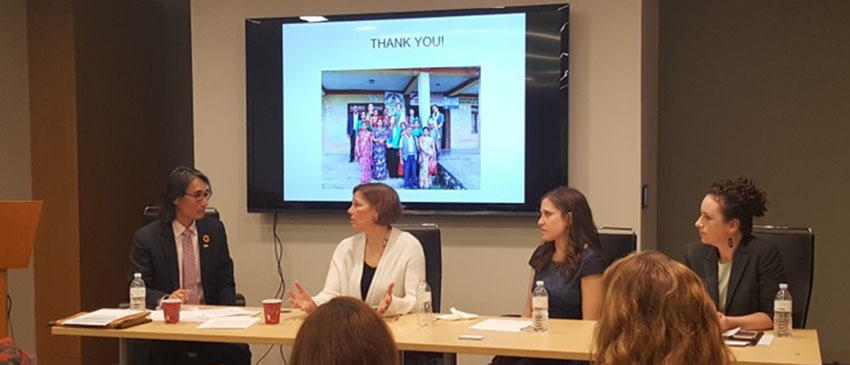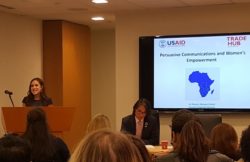
Exploring “The Critical Confidence Factor” in Gender Programming
Women’s empowerment is a key focus of many development activities, but are programs missing an ingredient for success? Many practitioners have noticed a critical confidence gap between men and women. Women’s lack of confidence often hinders their abilities to succeed in leadership roles and economic opportunities. How can we explain this gendered confidence gap, and what are the implications for women’s empowerment and gender equality programming?
Banyan Global addressed these questions with several key partners at a Washington, D.C.-based learning event on June 10, held in advance of the White House’s United State of Women Summit. The event featured Matthew D. Emry, Gender Advisor for the United States Agency for International Development’s (USAID) Africa Bureau, as moderator and included presentations from Lis Meyers, Banyan Global’s Senior Gender Specialist; Sue Richiedei, Senior Director of Plan’s International USA’s Women’s Leadership Institute; and Elizabeth Romanoff Silva, Program Officer for the Women’s Empowerment Program at The Asia Foundation. The speakers discussed self-confidence as a critical ingredient in women’s empowerment programming and highlighted techniques and promising approaches from their work. Approximately 50 development practitioners attended the event.
Ms. Meyers spoke about Banyan Global’s Persuasive Communications and Negotiations workshop for women entrepreneurs and business owners, developed under the USAID/Southern Africa Trade Hub. The workshop builds women’s self-confidence while equipping them with critical communication and presentation skills. Ms. Meyers’ presentation provided a technical deep-dive into the training, explaining how the workshop taught participants to establish credibility, maximize their visual and vocal impact, and utilize key principles of persuasion, all while giving participants the opportunity to practice and gain confidence in new skills. Ms. Meyers talked about the notable changes she saw in participants after the three-day trainings in Namibia, Zambia, and Botswana, highlighting critical confidence gains after participants watched video footage of their presentations.

Ms. Richiedei shared how Plan’s Global Women in Management program brings together female NGO leaders from around the world to enrich their leadership, management, and technical skills. The program provides women with month-long residential workshops, coaching, networking, and small grants. After the program, the women were more confident and better able to grow in their careers and influence change in their organizations.
Ms. Silva discussed The Asia Foundation’s work with female community mediators in Nepal. Community mediators provide an outlet for alternative dispute resolution, but the role was historically held only by men. The program has helped increase the percentage of female mediators from almost zero to 38%, and has also provided both male and female mediators with gender equality training. Ms. Silva reported that women mediators and disputants reported higher self-confidence as a result of the program.
The event concluded with a question and answer session moderated by Mr. Emry. Event attendees discussed culture and gender, and many noted that the event provided valuable insight for their work. Banyan Global was happy to provide an outlet for discussion and learning and will continue to incorporate confidence-building into our gender programming around the world.
